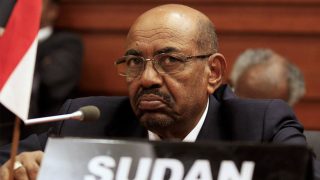Following the conclusion of an investigation into Sudan’s former president, Omal al-Bashir, the toppled leader has been formally charged with corruption. The charges according to the public prosecutor’s office are related to laws on suspected illicit wealth.
The SUNA news agency on Thursday quoted an official source as saying that al-Bashir “had been charged under foreign exchange possession materials, the heinous and suspicious wealth and emergency orders”. No further information was given on the matter, Al Jazeera reported.
Following his ouster in April, Bashir was charged with incitement and involvement in the killing of protesters the following month before state prosecutors ordered his interrogation on suspicion of money laundering and financing terrorism.
The former general is also under indictment by the International Court of Justice over alleged war crimes in the country’s western Darfur region and under him, Sudan was included on the list of sponsors of terrorism by the United States.
Bashir’s rule ended after he was overthrown and arrested by the military after months of massive protests and demonstrations against his autocratic 30-year reign. Many regard the subsequent probing and charging of the ex-leader a bold move but there are uncertainties over how the prosecution will play out.
A Sudan researcher at Cambridge University, Eric Reeves, told Al Jazeera that he doubted that there would be an open trial because al-Bashir “can point to any number of members of the current transitional military council and to their crimes”.
“The reason al-Bashir is being charged with corruption is because the transitional military council is trying to deflect attention from its own corruption. The more they can deflect blame onto al-Bashir and declare they are the new day, the more that it becomes possible for them to imagine creating a permanent military junta,” Reeves added.
Meanwhile, the U.S. this week joined an international effort to press Sudan’s military rulers and the opposition toward a deal on a transition to democracy. Washington’s newly appointed special envoy to Sudan, Donald Booth, and the Assistant Secretary of State for Africa Tibor Nagy, met the military council chief General Abdel Fattah al-Burhan.
Several world powers – including Russia and the Gulf Arab states – are reportedly trying to influence Sudan, whose stability is considered integral for the volatile central African region struggling against Islamist insurgencies from the Horn of Africa to Egypt and Libya.








